mobile Ansicht, to the English Version tap the flag


- ehemalige Burenrepublik
- seit 1910 Provinz Südafrikas
- 1994 umbenannt in "Free State"
- Eigenbezeichnungen:
– Afrikaans: Oranje-Vrijstaat
– Englisch: Orange Free State
• Flagge
• Flaggengeschichte
• Bedeutung/Ursprung der Flagge
• Landkarte
• Zahlen und Fakten
• Geschichte
• Ursprung des Landesnamens
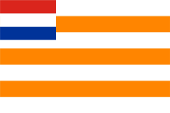
1856–1902
Nationalflagge,
Seitenverhältnis = 2:3,
Quelle, nach: Wikipedia (EN)




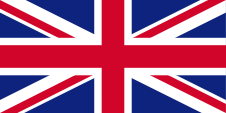
1848–1854,
Flagge Großbritanniens,
Seitenverhältnis = 1:2,
Quelle, nach: Wikipedia (EN)





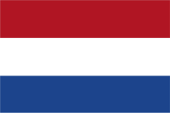
1854–1856,
Nationalflagge,
Seitenverhältnis = 2:3,
Quelle, nach: World Statesmen






1856–1902,
Nationalflagge,
Seitenverhältnis = 2:3,
Quelle, nach: Wikipedia (EN), World Statesmen




1900–1910,
Union Flag → quasi Nationalflagge,
Flagge Großbritanniens,
Seitenverhältnis = 1:2,
Quelle, nach: Wikipedia (EN)





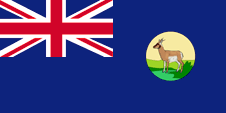
1904–1910,
theoretisch, wahrscheinlich nie verwendet,
Flagge der Regierung (Staatsflagge),
Seitenverhältnis = 1:2,
Quelle, nach: Wikipedia (EN), World Statesmen




Die Flagge des Oranje-Freistaats zeigte sieben Streifen in Weiß und Orange und im Obereck die Flagge der Niederlande. Die Farbe Orange ist die Nationalfarbe der Niederländer.
Nach dem heftigen Eroberungskrieg Großbritanniens wurde eine britische Kolonialverwaltung aufgebaut, die ein eigenes Badge (Abzeichen) verwendete, es zeigte eine Landschaft mit einem Springbock. Das war in allen britischen Kolonien üblich, eine eigene Symbolik bzw. Heraldik, denn Dokumente waren zu siegeln usw. Ein solches Badge war oft eine auf einer Scheibe platzierte regionale landschaftliche Darstellung, zeigte oft Schiffe, historische Begebenheiten oder konnte auch nur eine Art Logo sein. Sehr oft zeigte ein Badge zusätzlich den Namen des Landes oder auch einen Wahlspruch. Einige Besitzungen hatten aber auch schon von Anfang an ein Wappen, bzw. erhielten über die Jahre eine eigenes Wappen und das Badge wurde abgeschafft. Um ein weitgehend einheitliches Erscheinungsbild im fliegenden Ende der Flaggen zu gewährleisten, wurden Wappen und auch andere Symbole auf einer weißen Scheibe in der Größe der früheren Badges dargestellt. Es gab hier aber auch Ausnahmen, denn einige Kolonien verwendeten diese weiße Scheibe nicht, und platzierten ihr Wappen oder auch nur das Wappenschild – manchmal auch vergrößert – direkt auf das Flaggentuch.
Im Jahre 1902 wurde, nach der britischen Eroberung, die Union Flag gehisst. Das Land war Teil des britischen Weltreiches geworden. Die britische Verwaltung hätte ab 1902 einen "Blue Ensign", ein dunkelblaues Flaggentuch mit einer Flaggendarstellung – dem britischen Union Jack – in der Oberecke und dem Abzeichen der Verwaltung im wehenden Ende verwenden können. Allerdings hat die Admiralität dazu keine Genehmigung erteilt. Erstens waren die Blue Ensigns eigentlich zur Verwendung auf See gedacht, der Oranje-Freistaat war ein Binnenstaat, auch wenn diese Flaggen oft an Land verwendet wurden, zweitens wird man nach dem erbitterten Widerstand der Buren recht zögerlich mit den Symbolen der neuen Macht umgegangen sein, um nicht, wie vorher so oft gehabt, erneute Aufstände zu provozieren. Wenn es den "Blue Ensign" jemals wirklich gab, dann war er ohne Genehmigung verwendet worden, was aber in anderen Kolonien recht oft vorkam. Der Oranje-Freistaat wird vom Ensign-System ausgeschlossen gewesen sein.
Großbritannien hatte in Jahr 1864 ein Flaggensystem eingeführt, in dem:
• Kriegsschiffe einen sogenannten "White Ensign" (Marineflagge), eine weiße Flagge oft mit durchgehendem roten Georgskreuz und mit dem Union Jack in der Oberecke,
• Handelsschiffe einen "Red Ensign" (auch "Civil Ensign" → Bürgerflagge genannt, die eigentl. Handelsflagge), eine rote Flagge mit dem Union Jack in der Oberecke, und
• Dienstschiffe einen "Blue Ensign" (Regierungsflagge → die eigentl. Staatsflagge), eine blaue Flagge mit dem Union Jack in der Oberecke führten.
Seit 1865 durften Schiffe von Kolonialregierungen einen Blue Ensign mit einem Badge (Abzeichen) im fliegenden Ende führen. Die jeweiligen Regierungen sollten entsprechene Bagdes zur Verfügung stellen. Handelsschiffe und seefahrende Privatpersonen aus Kolonien dürfen nur dann einen Red Ensign mit Badge führen, wenn von der britischen Admiralität eine entsprechende Erlaubnis für die Kolonie erteilt wurde.
Als Provinz Südafrikas hatte das Land weiterhin keine eigene Flagge.
Quelle:
Flags of the World,
Die Welt der Flaggen,
Flaggen Enzyklopädie,
World Statesmen,
Wikipedia (EN)

Landkarte der Burenrepubliken und der Britischen Kapkolonie,
heutige Grenzen in Rot:
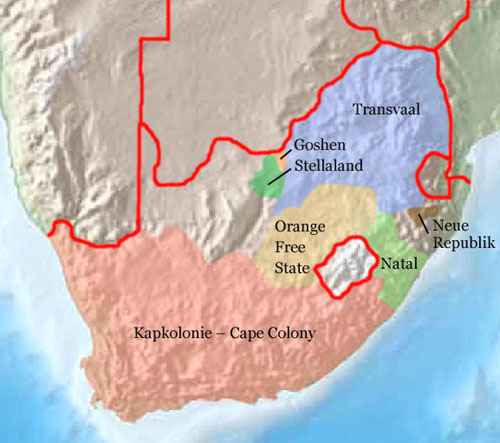
Quelle: Freeware, University of Texas Libraries, modyfied by: Volker Preuß

Fläche: ca. 181.299 km² (1875)
Einwohner: 207.500 (1890), davon 62.5% Schwarze, 37.1% Europäer, 0.4% andere
Religionen: 33.2% Holländisch-Reformierte Protestanten, 1,4% andere Christen, 65,4% Animisten und andere
Hauptstadt: Bloemfontein, 2.567 Ew. (1880)
Sprachen: Afrikaans, Englisch, Bantusprachen
Währung: Oranje-Freistaat Pfund
Zeitzone: MEZ + 1 h
Quelle:
Wikipedia (EN),
World Statesmen,
Meyers Konversationslexikon

1602 · die Niederländer nehmen das Land um das Kap der Guten Hoffnung in Besitz (Kapland), Besiedlung durch Buren (Bauern niederländischer und deutscher Abstammung, Eigenbezeichnung: Afrikaander)
1652 · Jan van Riebeeck gründet die Siedlung Kapstadt im Auftrag der Niederländischen-Ostindischen Kompanie
1806 · Großbritannien besetzt das Kapland
1814 · Großbritannien nimmt Kapland offiziell in Besitz, Gründung der Britischen Kapkolonie
1833 · Aufhebung der Sklaverei
1836–1885 · die Buren verlassen in langen Treks das Kapland in Richtung Osten und Nordosten und gründen mehrere Burenrepubliken
1845 · erste Britische Siedlungen jenseits des Flusses Orange
1848 · Großbritannien annektiert die Gebiete jenseits des Flusses Orange, zur Kapkolonie
1854 · Errichtung des Oranje-Freistaats durch einwandernde Buren
1899–1902 · Burenkrieg, Großbritannien unterwirft die Burenstaaten Oranje-Freistaat und Transvaal, beide werden Britische Kolonien, Verfolgung und Internierung der Buren, Einrichtung von Konzentrationslagern ("Concentration Camps") für die Buren
1906 · Großbritannien gewährt Autonomie
1910 · Großbritannien schließt die Kolonien Oranje-Freistaat, Transvaal, Natal und Kapprovinz zur Südafrikanischen Union zusammen, Status eines britischen Dominions für Südafrika
27.04.1994 · neue Verfassung für Südafrika, offizielle Abschaffung der Rassentrennung, Auflösung der Homelands, Wiederaufnahme in den Commonwealth of Nations, Umbenennung der Provinz Oranje-Freistaat in "Freistaat"
Quelle:
Wikipedia (EN),
World Statesmen,
Meyers Konversationslexikon

Der Name des "Oranje-Freistaats" bezieht sich auf den Fluss Oranje (engl. Orange), ein großer Fluss im zentralen Südafrika.
Quelle: Volker Preuß


![]()





















